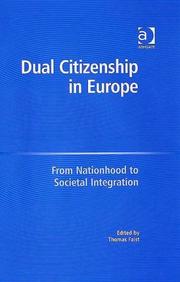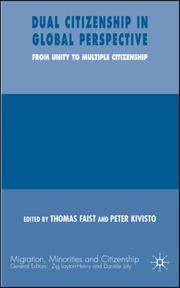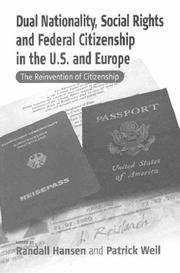| Listing 1 - 10 of 15 | << page >> |
Sort by
|

ISBN: 9041119329 9786610468188 1417551399 1280468181 9047403185 9781417551392 Year: 2003 Publisher: The Hague New York Kluwer Law International
Abstract | Keywords | Export | Availability | Bookmark
 Loading...
Loading...Choose an application
- Reference Manager
- EndNote
- RefWorks (Direct export to RefWorks)
The increased emergence of dual and multiple nationality in our globalized world has recently led to public and scholarly debates on a number of resulting practical questions. This book comprehensively evaluates the legal status of dual nationals on the basis of a comparative analysis, with emphasis on practice and law in the United States of America, the Federal Republic of Germany, Turkey and other selected countries, comprising contributions of both academics and practitioners. Among the legal subjects examined more intensively are the exercise of political rights by dual nationals, including voting and office holding, performance of military service, loss and withdrawal of citizenship, and effects of dual nationality on judicial cooperation, as well as aspects of private international law. The authors pay attention to developmental trends and legal changes in various countries, and also to the philosophical and theoretical perspectives underlying various practices. Specific recommendations for states dealing with dual nationality complete the investigation.
Dual nationality --- Conflict of laws --- Citizenship --- Dual nationality. --- International comparison. --- Double nationality --- Dual allegiance --- Dual citizenship --- Nationality, Dual --- Nationality, Plural --- Plural nationality --- Law and legislation --- World politics.

ISBN: 1317147642 1317147634 1281103780 9786611103781 0754683524 9780754683520 9780754649144 0754649148 9781317147640 9781317147633 9781281103789 6611103783 9781315578231 9781317147626 9781138275584 1315578239 Year: 2007 Publisher: Aldershot, England ; Burlington, VT : Ashgate,
Abstract | Keywords | Export | Availability | Bookmark
 Loading...
Loading...Choose an application
- Reference Manager
- EndNote
- RefWorks (Direct export to RefWorks)
In an age of terrorism and securitized immigration, dual citizenship is of central concern. The contributors to this timely volume examine policies regarding dual citizenship across Europe, covering a wide spectrum of countries. The case studies explore the negotiated character and boundaries of political membership and the fundamental beliefs and arguments which have shaped debates and policies on citizenship.
Citizenship --- Dual nationality --- Double nationality --- Dual allegiance --- Dual citizenship --- Nationality, Dual --- Nationality, Plural --- Plural nationality --- Conflict of laws --- Law and legislation
Book
ISBN: 9780814724347 0814724345 9780814785829 0814785824 0814724418 Year: 2016 Publisher: New York, NY
Abstract | Keywords | Export | Availability | Bookmark
 Loading...
Loading...Choose an application
- Reference Manager
- EndNote
- RefWorks (Direct export to RefWorks)
Read Peter's Op-ed on Trump's Immigration Ban in The New York TimesThe rise of dual citizenship could hardly have been imaginable to a time traveler from a hundred or even fifty years ago. Dual nationality was once considered an offense to nature, an abomination on the order of bigamy. It was the stuff of titanic battles between the United States and European sovereigns. As those conflicts dissipated, dual citizenship continued to be an oddity, a condition that, if not quite freakish, was nonetheless vaguely disreputable, a status one could hold but not advertise. Even today, some Americans mistakenly understand dual citizenship to somehow be “illegal”, when in fact it is completely tolerated. Only recently has the status largely shed the opprobrium to which it was once attached.At Home in Two Countries charts the history of dual citizenship from strong disfavor to general acceptance. The status has touched many; there are few Americans who do not have someone in their past or present who has held the status, if only unknowingly. The history reflects on the course of the state as an institution at the level of the individual. The state was once a jealous institution, justifiably demanding an exclusive relationship with its members. Today, the state lacks both the capacity and the incentive to suppress the status as citizenship becomes more like other forms of membership. Dual citizenship allows many to formalize sentimental attachments. For others, it’s a new way to game the international system. This book explains why dual citizenship was once so reviled, why it is a fact of life after globalization, and why it should be embraced today.
Dual nationality --- Double nationality --- Dual allegiance --- Dual citizenship --- Nationality, Dual --- Nationality, Plural --- Plural nationality --- Citizenship --- Conflict of laws --- History. --- Law and legislation
Book
ISBN: 908964444X 9048516943 1283698412 Year: 2012 Publisher: Amsterdam : Amsterdam University Press,
Abstract | Keywords | Export | Availability | Bookmark
 Loading...
Loading...Choose an application
- Reference Manager
- EndNote
- RefWorks (Direct export to RefWorks)
Dual nationality has been the subject of heated debate in the Netherlands in recent years. In this historical and international comparative study, De Hart shows that such debates are not unique to our time, nor to the Netherlands. An analysis of political debates in the United States, Germany and the Netherlands since 1945 shows that dual nationality is viewed very differently, depending on the context and the group being discussed. The analysis is interspersed with interviews with immigrants, emigrants and members of mixed families about the sometimes very personal meaning of dual nationality. Discussions on the dual nationality of Japanese-Americans during the Second World War, of Dutch emigrants in South Africa in the 1980s, are discussed.
Dual nationality --- Double nationality --- Dual allegiance --- Dual citizenship --- Nationality, Dual --- Nationality, Plural --- Plural nationality --- Citizenship --- Conflict of laws --- Law and legislation

ISBN: 023000654X 9780230006546 Year: 2007 Publisher: Basingstoke : Palgrave Macmillan,
Abstract | Keywords | Export | Availability | Bookmark
 Loading...
Loading...Choose an application
- Reference Manager
- EndNote
- RefWorks (Direct export to RefWorks)
#SBIB:321H30 --- Hedendaagse politieke en sociale theorieën (vanaf de 19de eeuw): algemeen (incl. utilitarisme, burgerschap) --- Citizenship --- Dual nationality --- Globalization --- Double nationality --- Dual allegiance --- Dual citizenship --- Nationality, Dual --- Nationality, Plural --- Plural nationality --- Conflict of laws --- Law and legislation

ISBN: 1571818049 1571818057 9781571818058 9781571818041 1789204119 9781789204117 Year: 2002 Publisher: New York: Berghahn,
Abstract | Keywords | Export | Availability | Bookmark
 Loading...
Loading...Choose an application
- Reference Manager
- EndNote
- RefWorks (Direct export to RefWorks)
Dual nationality --- Conflict of laws --- Double nationalité --- Nationalité (Droit international privé) --- Citizenship --- Citizenship. --- Double nationalité --- Nationalité (Droit international privé) --- Dual nationality - United States --- Dual nationality - Europe --- Conflict of laws - Citizenship --- Double nationality --- Dual allegiance --- Dual citizenship --- Nationality, Dual --- Nationality, Plural --- Plural nationality --- Law and legislation
Book
ISBN: 9789041126627 9041126627 Year: 2008 Volume: 56 Publisher: Alphen aan den Rijn Kluwer Law International
Abstract | Keywords | Export | Availability | Bookmark
 Loading...
Loading...Choose an application
- Reference Manager
- EndNote
- RefWorks (Direct export to RefWorks)
Citizenship --- Kinship (Law) --- Dual nationality --- Citoyenneté --- Parenté (Droit) --- Double nationalité --- European law --- International private law --- European Union --- Domestic relations --- Double nationality --- Dual allegiance --- Dual citizenship --- Nationality, Dual --- Nationality, Plural --- Plural nationality --- Conflict of laws --- Law and legislation --- Citizenship - European Union countries --- Kinship (Law) - European Union countries --- Dual nationality - European Union countries
Book
ISBN: 1108566375 1108554172 1108676456 1108429157 9781108676458 9781108554176 9781108429153 9781108453189 110845318X 9781108453189 Year: 2018 Publisher: Cambridge [UK] New York, NY
Abstract | Keywords | Export | Availability | Bookmark
 Loading...
Loading...Choose an application
- Reference Manager
- EndNote
- RefWorks (Direct export to RefWorks)
Citizenship is no longer an exclusive relationship. Many people today are citizens of multiple countries, whether by birth, naturalization, or even through monetary means, with schemes fast-tracking citizenship applications from foreigners making large investments in the state. Moral problems surround each of those ways of acquiring a second citizenship, while retaining one's original citizenship. Multiple citizenship can also have morally problematic consequences for the coherence of collective decisions, for the constitution of the demos, and for global inequality. The phenomenon of multiple citizenship and its ramifications remains understudied, despite its magnitude and political importance. In this innovative book, Ana Tanasoca explores these issues and shows how they could be avoided by unbundling the rights that currently come with citizenship and allocating them separately. It will appeal to scholars and students of normative political theory, citizenship, global justice, and migration in political science, law, and sociology.
Dual nationality. --- Citizenship. --- Conflict of laws --- Citizenship --- Dual nationality --- Birthright citizenship --- Citizenship (International law) --- National citizenship --- Nationality (Citizenship) --- Political science --- Public law --- Allegiance --- Civics --- Domicile --- Political rights --- Double nationality --- Dual allegiance --- Dual citizenship --- Nationality, Dual --- Nationality, Plural --- Plural nationality --- Law and legislation
Book
ISBN: 9782760620391 2760620395 9791036504037 2760624854 2760630188 Year: 2007 Publisher: Presses de l’Université de Montréal
Abstract | Keywords | Export | Availability | Bookmark
 Loading...
Loading...Choose an application
- Reference Manager
- EndNote
- RefWorks (Direct export to RefWorks)
Dans nos sociétés contemporaines, sans cesse bouleversées par les restructurations économiques et les recompositions sociales, les institutions étatiques doivent faire face à la difficulté d'assurer l'inclusion sociale et la participation à la vie collective des citoyens. En Europe comme dans les Amériques, nous assistons à des mutations importantes dans les régimes de citoyenneté et à des changements de formes de citoyenneté. Cet ouvrage examine en détail ces transformations, à partir de perspectives multiples qui, non seulement croisent les optiques européennes et canadiennes, mais mobilisent plusieurs disciplines, que ce soit la science politique, la sociologie, le droit ou la philosophie.
Citizenship --- Discrimination --- Citoyenneté --- Citoyenneté --- Citizenship. --- Dual nationality. --- World citizenship. --- Earth citizenship --- Global citizenship --- Supranational citizenship --- Transnational citizenship --- Double nationality --- Dual allegiance --- Dual citizenship --- Dual nationality --- Nationality, Dual --- Nationality, Plural --- Plural nationality --- Conflict of laws --- Birthright citizenship --- Citizenship (International law) --- National citizenship --- Nationality (Citizenship) --- Political science --- Public law --- Allegiance --- Civics --- Domicile --- Political rights --- Law and legislation --- Citoyenneté. --- Double nationalité. --- Citoyenneté mondiale. --- Citoyennet --- Aspect social. --- Social aspects. --- double nationalité --- citoyenneté mondiale --- citoyenneté --- CITOYENNETE --- Pays de l'Union européenne --- CANADA --- Québec
Book
ISBN: 0199938652 9786612768408 0199780536 1282768409 0199889872 Year: 2010 Publisher: New York : Oxford University Press,
Abstract | Keywords | Export | Availability | Bookmark
 Loading...
Loading...Choose an application
- Reference Manager
- EndNote
- RefWorks (Direct export to RefWorks)
In this text, the author proposes a re-consideration of both the meaning of transnationalism and the nature of national and state identity in global politics. In order to do this, Varadarajan draws from two literatures that are rarely brought into conversation with IR scholarship: postcolonial theory and historical-materialism.
Transnationalism --- Dual nationality --- Social aspects --- Developing countries --- Emigration and immigration. --- Foreign relations. --- Double nationality --- Dual allegiance --- Dual citizenship --- Nationality, Dual --- Nationality, Plural --- Plural nationality --- Citizenship --- Conflict of laws --- Trans-nationalism --- Transnational migration --- International relations --- Law and legislation --- Emerging nations --- Fourth World --- Global South --- LDC's --- Least developed countries --- Less developed countries --- Newly industrialized countries --- Newly industrializing countries --- NICs (Newly industrialized countries) --- Third World --- Underdeveloped areas --- Underdeveloped countries
| Listing 1 - 10 of 15 | << page >> |
Sort by
|

 Search
Search Feedback
Feedback About UniCat
About UniCat  Help
Help News
News